Court Compromises on Forced Medication
- Share via
WASHINGTON — A delusional dentist who believed that communists had contaminated his gold fillings and who told police that he saw a leopard boarding a bus won a ruling from the Supreme Court on Monday that prevents officials from forcibly medicating him -- and others like him -- so they can be made fit to stand trial.
Charles T. Sell practiced dentistry in St. Louis despite a delusional disorder that caused him to believe that the government was persecuting him.
Prosecutors in 1997 arrested him and charged him with 63 counts of Medicaid fraud.
The dentist had submitted phony X-rays for nonexistent patients, they allege.
Since then, Sell has been in a federal prison hospital.
He is mentally incompetent to stand trial, but he has refused to take antipsychotic medication that could restore his mental health.
The Supreme Court took up his case to decide for the first time whether criminal defendants who are not a danger to themselves or others can be given mind-altering drugs against their will.
Monday’s opinion in Sell’s case is a compromise result.
“The Constitution permits the government involuntarily to administer antipsychotic drugs to a mentally ill defendant facing serious crime charges in order to render [him] competent to stand trial,” said Justice Stephen G. Breyer for the court.
However, to win such an order, the burden is on prosecutors to show that the trial is necessary and that the proposed medication is necessary, effective and harmless to the defendant, he added.
“Only in rare cases is forced medication of a nonthreatening defendant justified,” Breyer added.
In the past, the court had said that dangerous, violent prisoners -- as well as suspected murderers -- may be given drugs against their will to calm them.
But Sell’s case was different, because his alleged crime was nonviolent and he was seen as not dangerous.
By a 6-3 vote, the justices overturned two lower courts that had endorsed the forced medication of Sell.
Without finally resolving the matter, the high court sent Sell’s case back to St. Louis for the trial judge to reconsider whether the forced medication was justified.
“We won, but what happens next remains to be seen,” said Sell’s attorney, Barry Short of St. Louis.
He added that his client opposes the use of mind-altering drugs.
“He is a very bright person, and he understands the side effects of the drugs,” Short said.
“He also doesn’t think there’s anything wrong with him.”
The lawyer disagrees with his client on the latter point.
“He is legally incompetent to stand trial,” Short said.
While Sell resists taking drugs, his lawyer also worries that the drugs might undercut his defense.
Short maintained that the dentist was delusional when he allegedly sent phony X-rays to obtain Medicaid reimbursement.
But if the drugs render Sell calm and lucid, the jury is not likely to believe that his delusions explain his alleged behavior.
In 1998, the shooting of two police officers at the U.S. Capitol focused attention on the issue of forced medication. The suspected gunman, Russell Weston Jr., had a history of schizophrenia, and he was ruled incompetent to stand trial.
However, a federal judge also ruled that he could be medicated against his will.
That order was allowed to stand by a U.S. Court of Appeals and the Supreme Court.
Since then, Weston’s condition has improved, but authorities have said he is still not fit to be tried.
The Justice Department insists that forced medication works in most instances. Citing recent data, department lawyers said that 285 mentally ill defendants needed medication to stand trial.
Of these, 87% were later found to be competent to stand trial.
Most of these defendants agreed to be treated. Only 59 refused and were treated under a forced-medication order.
Still, Breyer’s opinion cites several reasons for not permitting forced medication.
Sometimes, a truly disturbed defendant -- such as Sell -- can be held in a treatment center for far longer than his possible prison term, Breyer said.
The dentist has already spent more time in custody than a fraud conviction would warrant.
Breyer also stressed that the drugs must be “medically appropriate” for the patient.
A drug that sedates the defendant might be good for prosecutors, but it would harm the defendant and undercut his right to a fair trial, he said.
In dissent, Justices Antonin Scalia, Sandra Day O’Connor and Clarence Thomas said the court made a mistake in hearing Sell’s case.
Defendants have a right to appeal only after a trial is finished, Scalia said.
“Today’s narrow holding will allow criminal defendants to engage in opportunistic behavior,” Scalia said.
“Halfway through trial, [they may] abruptly refuse” to take their medication and bring the trial to a halt, he said.
Some opponents of forced drugging called Monday’s decision a defeat, while others saw it as a victory.
Judith Appel, a lawyer for the Drug Policy Alliance in Oakland, denounced the court for permitting forced medication in some instances.
“The idea of the state pumping powerful, mind-altering drugs into an unwilling citizen is chilling under any circumstances,” Appel said. “You’re flat-out saying goodbye to core American values.”
Denise Lieberman, an American Civil Liberties Union lawyer in St. Louis, applauded the court for recognizing a defendant’s “fundamental interest in being free from involuntary medication.”
“We see this as a victory, because the government has to jump through a lot of hoops,” she added.
The American Psychological Assn. is generally opposed to the use of antipsychotic drugs, and its lawyers were pleased with the result.
“This is in line with our view that drugs should be the last resort,” said Nathalie Gilfoyle, the association’s general counsel.
More to Read
Sign up for Essential California
The most important California stories and recommendations in your inbox every morning.
You may occasionally receive promotional content from the Los Angeles Times.













